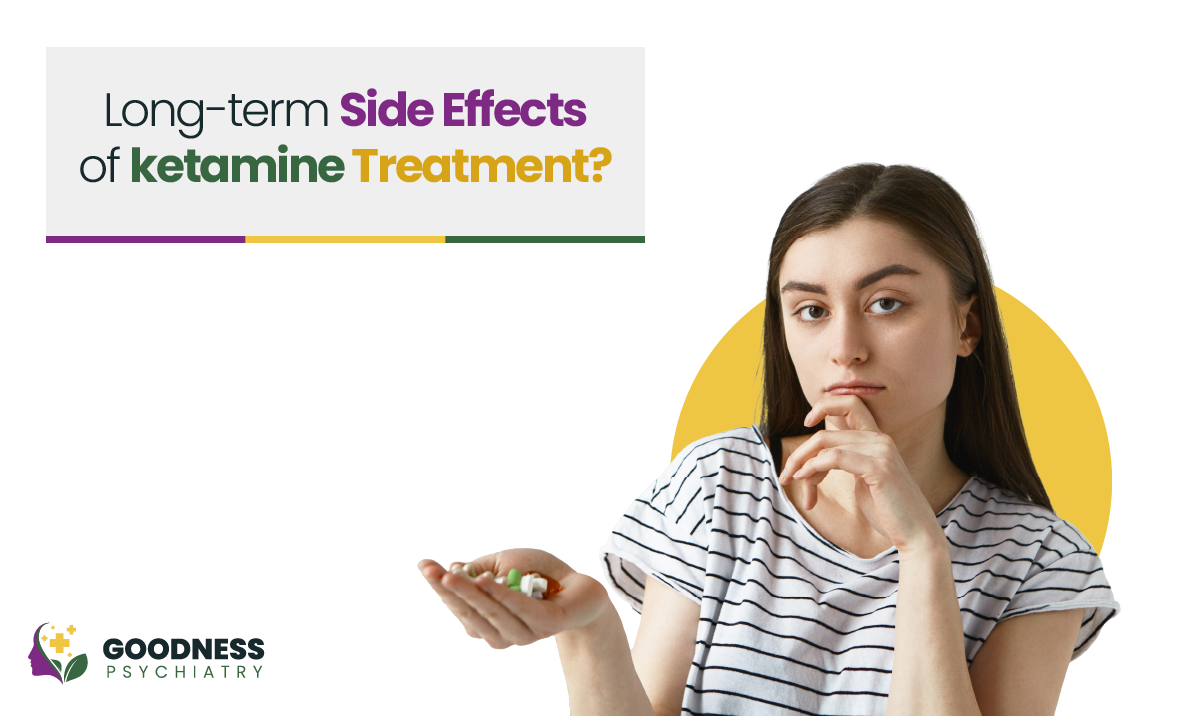Ketamine was first created as an anesthetic, but it has recently become famous for quickly helping people with depression and PTSD who are not responding to other treatments.
Even though ketamine treatment seems like it could help with therapy, both patients and healthcare providers need to know what long-term side effects of ketamine treatment?
Goodness Psychiatry provides oral ketamine treatment for the following:
- Treatment-Resistant Depression
- Severe Anxiety Disorders
- Suicidal Thoughts
- Bipolar Disorder
- Obsessive-Compulsive Disorder (OCD)
If you have these issues, consider Goodness Psychiatry. You can get oral ketamine dose for depression.
Ketamine Treatment: An Overview
Ketamine has been used as an anesthetic in hospitals for more than 50 years. Sub-anesthetic doses of ketamine have been used to treat severe depression, PTSD, and long-term pain in recent years.
This off-label use has shown rapid and robust improvements in symptoms, often within hours.
However, because ketamine is becoming more popular as a treatment, we need to know more about its long-term effects.
Common Side Effects of Ketamine
Before we talk about the long-term side effects, it is important to talk about the common side effects of ketamine use:
- Dissociation: A sense of being detached from reality, frequently called an “out-of-body” encounter.
- Hallucinations: You might see or hear things that are not there, especially at higher doses.
- Vomiting and Nausea: These are common side effects, particularly if injected.
- Increased Heart Rate and Blood Pressure: Ketamine may temporarily raise heart rate and blood pressure.
- Dizziness and drowsiness: These side effects are frequently experienced, especially right after medication.
Long-Term Side Effects of Ketamine Treatment
Ketamine can help with some mental health problems right away, but using it for a long time can lead to several problems, including
Cognitive Impairment
Individuals who use ketamine for a long time may experience issues with their thinking and memory, mainly when it comes to making choices.
Being able to think differently can impact your daily life and overall well-being. Studies show that these issues might not go away even after stopping ketamine use. However, the level of severity can vary from person to person.
Bladder and Urinary Tract Issues
If you use ketamine for a long time, you might get ketamine-induced cystitis, which is an inflammation of the bladder condition. Symptoms include frequent urination, urgency, and pelvic pain. In the worst cases, this condition can damage the bladder and kidneys over time.
Addiction and Dependence
Ketamine can be addicting, especially when used for fun or without a doctor’s supervision. People who use drugs for a long time may develop tolerance, which means they need higher doses to get the same effect, and dependence, which means they have withdrawal symptoms when they stop using the drug.
Mental Health Concerns
Ketamine can help people who are depressed and anxious, but long-term use may make these conditions worse in some people. There is also a chance of getting new mental health problems, like more anxiety, paranoia, or depressive episodes.
Cardiovascular Effects
Long-term use of ketamine can have effects on the heart and blood vessels, such as raising blood pressure and heart rate over time. These changes usually only last a short time, but long-term use can cause long-lasting heart problems, especially in people who already have heart problems.
Liver Function
There is evidence that using ketamine for a long time can change how the liver works. High levels of liver enzymes have been seen in long-term users, which could mean that their livers are getting damaged. People who have been taking ketamine for a long time should have their liver function checked regularly.
Mitigating Long-Term Side Effects of Ketamine Treatment
It is important to follow these rules to lessen the long-term effects of ketamine treatment:
- Medical Supervision: Ketamine should only be used with the help of a trained medical professional.
- Regular Checkups: Regularly checking your cognitive function, urinary health, and liver function can help you find and treat side effects early.
- Controlled Dosing: You should use the lowest dose that works and not raise it without talking to a doctor first.
- Limit Frequency: To lower the risk of long-term side effects, lower the number of times you get ketamine treatments.
- Planned Treatment: Combine ketamine therapy with other types of therapy, like psychotherapy, to get to the root of the problem and lower the need for medication.
Conclusion, long-term side effects of ketamine treatment
Ketamine therapy is a promising option for people with depression, PTSD, or chronic pain that does not respond to other treatments.
However, it needs to be used carefully and closely because of the possible long-term side effects of ketamine treatment.
Patients and healthcare providers can get the most out of ketamine’s benefits while minimizing its risks by understanding and dealing with these issues.
Always talk to a doctor or nurse to ensure the treatment fits your needs and situation.
FAQs
How long does nausea last after ketamine?
Ketamine usually makes people feel sick for a few hours after they get it infused. However, it can differ for each person depending on how they react and how much they take. If nausea persists, consult your healthcare provider.
How long do ketamine infusion side effects last?
Side effects from ketamine infusions, such as dizziness, dissociation, and increased blood pressure, usually subside within a few hours. Most side effects should be gone within 24 hours. Always discuss any prolonged side effects with your doctor.
Does ketamine therapy get you high?
At therapeutic doses, ketamine can cause a feeling of dissociation or altered perception, but it is not typically described as a “high” recreational use. Medical professionals closely monitor the effects to ensure safety and efficacy.

